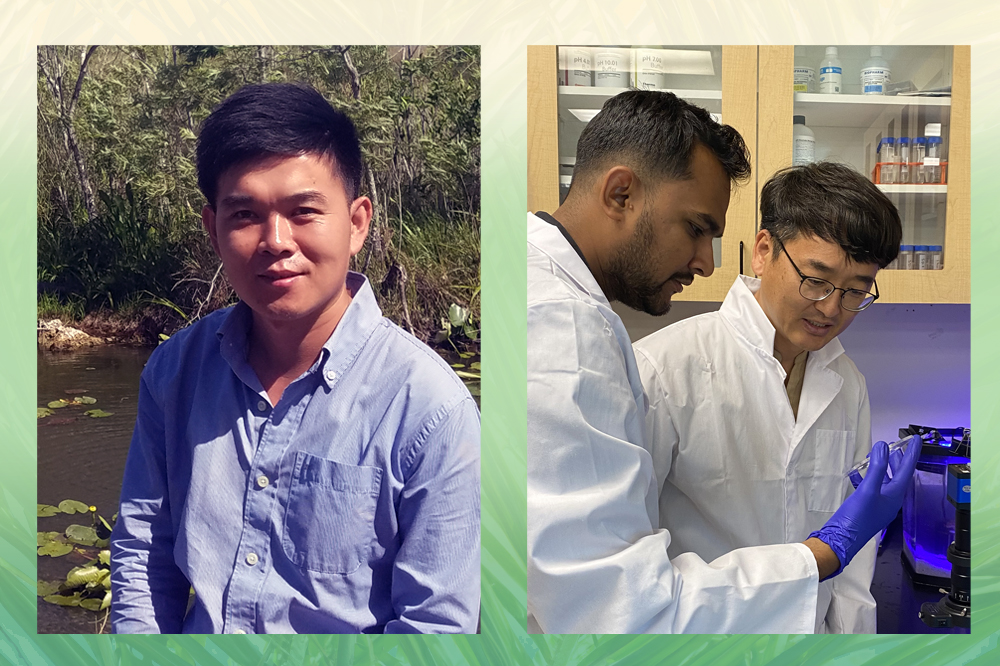Inaugural ECOS Award Winners Announced
Tuesday, May 07, 2024
The Schmidt College of Science is pleased to announce the inaugural winners of the School of Environmental, Coastal, and Ocean Sustainability (ECOS) Research Award, Weibo Liu, Ph.D., associate professor in the Department of Geosciences, and Myeongsub (Mike) Kim, Ph.D., associate professor in the Department of Ocean and Mechanical Engineering, FAU College of Engineering and Computer Science. The awards recognize the most influential published manuscripts on emerging topics related to ECOS. Both Liu and Kim were formally recognized during the college’s joint Master of Science with a Major in Environmental Science and Master of Science in Marine Science and Oceanography colloquium on April 23, and each received a $500 honorarium.
“The ECOS research award was created to further highlight, recognize, and reward the exceptional faculty and impactful environmental research that is being conducted at FAU,” said Mike McCoy, Ph.D., associate director, School of Environmental, Coastal and Ocean Sustainability, and associate professor of quantitative ecology, FAU Harbor Branch Oceanographic Institute. “I think the research being conducted by Drs. Liu and Kim exemplifies the breadth, creativity, and impact of science that is needed to address contemporary environmental challenges.”
Liu’s article, “The spatiotemporal assessments for tidal flat erosion associated with urban expansion in the conterminous coastal United States from 1985 to 2015,” centers around the rapid, worldwide urbanization of coastal areas, including tidal flats. Tidal flats make up the coastal wetlands that protect against destructive powers from the ocean such as waves, tsunamis, and hurricanes. This first-of-its kind study provides a “big picture” examination that demonstrates the impacts of urban expansion on tidal flat environments across the contiguous U.S.
Results of the study, published in the journal, Science of The Total Environment , among others, reveal how human activities, rather than natural factors, have impacted tidal flat environments in the contiguous U.S. Urban expansions have not only substantially squeezed the space of tidal flats, but also significantly affected the surrounding tidal flat environments over the last three decades.
“The conflict between human activity and coastal environment has become increasingly acute, which calls for higher levels of awareness and concern,” stated Liu. “Our study provides worthwhile data for scientists and lawmakers alike that will contribute to helping to develop policy and programs that address how massive urban expansion has tremendously undermined the environment of tidal flats along the U.S. coast.”
Kim’s work aimed to evaluate the performance of natural seawater-waste concrete solutions for CO 2 capture and storage, potentially mitigating pressing global issues such as climate change and ocean acidification. In conventional carbon capture, freshwater-amine solutions have been utilized due to their excellent CO 2 dissolution property in commercial power plants. However, the scarcity of freshwater, toxicity of amine chemicals, and cost- and energy-intensive operations deem water-amine unreasonable for large-scale applications.
As a more sustainable option, Kim’s study, “Towards green carbon capture and storage using waste concrete-based seawater: A microfluidic analysis,” published in the Journal of Environmental Management , shows that waste concrete-seawater could be a potentially effective solvent for CO 2 capture and storage, which could be used in industries as a cost-effective and environmentally green solution. The research outcomes would also help create a healthier ocean environment, as it will prevent ocean water from acidification.
“ I am honored to receive the ECOS research award, and I am so thankful to the award committee for their consideration of our journal manuscript,” expressed Kim. “I’d like to express my sincere appreciation to all my graduate and undergraduate students for their exceptional contributions to the work presented in this publication.”
The funding will allow Kim’s team to further investigate innovative green solutions for carbon capture and utilization in commercial plants. In addition, Kim hopes that the results of their work will complement the research portfolio FAU’s School of Environmental, Coastal, and Ocean Sustainability, and broaden the impact of environmental research to other colleges and schools and beyond to the public.